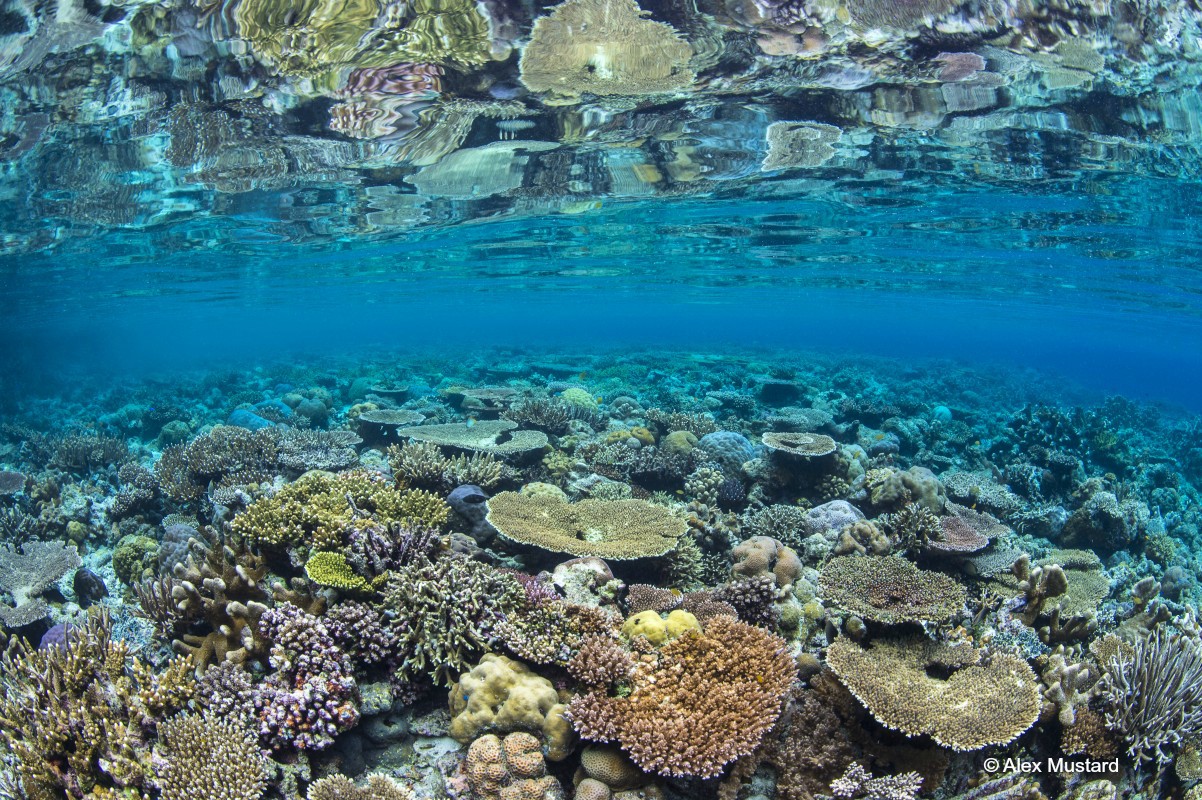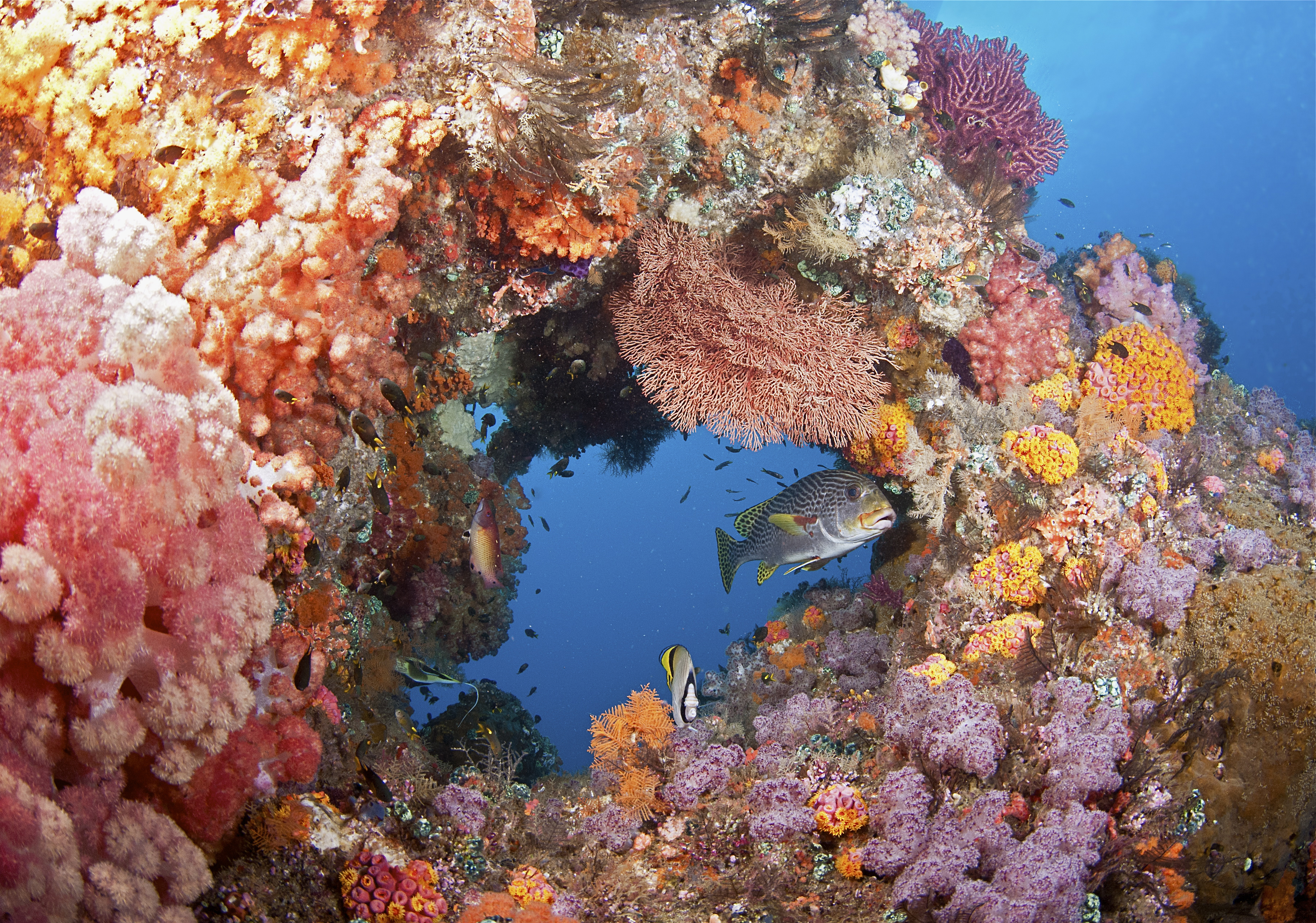Year of the Reef and Earth Day 2018
Two Celebrations, One Theme: End Plastic Pollution

We have much to celebrate this Earth Day, April 22! A growing number of people, all over the world, are changing their attitudes and behaviors towards plastic. Recognizing how harmful plastic is to marine life and fragile ecosystems, people are taking actions, fins on and fins off, to see a significant reduction in plastic waste and stop the Ugly Journey of our Trash. 2018 is also the third International Year of the Reef! With new evidence showing that our obsession with all things plastic is also poisoning coral reefs, the growing movement for a world without plastic pollution gives us hope.
Plastic and Coral Reefs
In a survey of 159 coral reefs published in Science this year, researchers estimate that reefs across the Asia Pacific region are littered with more than 11 billion pieces of plastic larger than 5 centimeters. If those pieces were lined up next to each other, they would reach around the Earth nearly 14 times, at the very least. To make matters worse, the study reveals that corals with plastic on them were 20 times more likely to be diseased than those that were not polluted.
The results of our very own survey show that 64% of all marine debris pieces removed and reported by Dive Against Debris® volunteer divers are plastics. Our citizen science program has reached a milestone in March with over ONE MILLION pieces of trash removed from the ocean. This milestone comes at a time of unprecedented focus on the issue of plastic pollution and its impact on the health of the ocean. There is myriad evidence of marine wildlife fatally mistaking plastic debris, particularly microplastics, for food.
 Value and Threats to Coral Reefs
Value and Threats to Coral Reefs
Coral reefs cover less than one percent of the ocean floor, yet support 4,000 species of fish, hundreds of species of sharks and rays, crustaceans, sea turtles and hundreds of species of coral. Reefs support extraordinary biodiversity and are vital to the health of the ocean and therefore, the health of the planet. As well as being a habitat for so many aquatic species, coral reefs have a global estimated value of $2.7 trillion per year from tourism and food. They provide protection for shorelines by absorbing energy from waves and contain pharmaceutical compounds used in medicines around the world. The ecosystems on coral reefs support half a billion people and a quarter of all marine life.
In the past 30 years, we’ve lost about 50% of corals globally. As well as overfishing, coastal development and climate change, pollution is a big issue damaging coral reefs. Marine debris is a growing form of pollution and includes litter from land, whether it’s discarded by the coast or inland, it could still end up in the ocean, from entering drains or flowing down rivers, all waterways eventually lead to the ocean. As governments and NGOs work to try to protect reefs from major threats such as climate change and warming waters, addressing plastic pollution must now also be a priority or these efforts could well be less effective.
Ocean Optimism: Local Actions for Global Impact
So the threats are pretty big. Plastic pollution and many other threats are damaging our blue planet and all that call it home, but there is hope. It’s not all doom and gloom! The movement for a clean, healthy ocean is gaining momentum. Our local actions collectively protect the most vulnerable marine species and decrease pollution. Our global community of ocean lovers is not waiting. They’re leading! My Ocean is Project AWARE’s growing community of changemakers, speaking out and taking actions, fins on and fins off, to protect what they love. From local cleanups to writing to politicians to increase protection for endangered species, together we’re a grassroots movement making lasting change for the ocean all year round.
The My Ocean community and our growing army of debris activists has been tackling marine debris from beneath the waves through the citizen science program, Dive Against Debris, removing and reporting marine debris collected from the ocean floor. The data collected by scuba divers is vital for influencing policy change to help prevent plastic pollution before it reaches our ocean. More than 49,000 scuba divers from 114 countries around the world have taken part in surveys to clean up the ocean showing that by working together we can make an impact.
All our actions, big or small, make a difference, divers see firsthand the effects we are creating underwater and are continuing to work to make them positive ones.
If you love the ocean, join the International Year of the Reef and Earth Day celebrations! Start the adventure today! Start with joining our global My Ocean community.
Photos by Award Winning Underwater Photographers Alex Mustard and Jayne Jenkins



